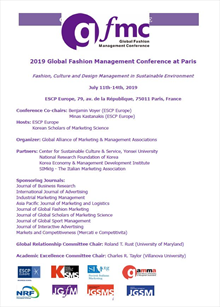간행물
Global Fashion Management Conference

- 발행기관 글로벌지식마케팅경영학회
- 자료유형 학술대회
- 간기 부정기
- ISSN 2288-825X (Print)
- 수록기간 2015 ~ 2024
- 주제분류 사회과학 > 경영학 사회과학 분류의 다른 간행물
- 십진분류KDC 325DDC 330
권호리스트/논문검색
2019 Global Fashion Management Conference at Paris (2019년 7월) 224건
201.
2019.07
구독 인증기관 무료, 개인회원 유료
Global Fashion Management Conference
2019 Global Fashion Management Conference at Paris
pp.766-769
글로벌지식마케팅경영학회
3,000원
202.
2019.07
구독 인증기관 무료, 개인회원 유료
Global Fashion Management Conference
2019 Global Fashion Management Conference at Paris
pp.770-776
글로벌지식마케팅경영학회
4,000원
203.
2019.07
구독 인증기관 무료, 개인회원 유료
Global Fashion Management Conference
2019 Global Fashion Management Conference at Paris
pp.777-779
글로벌지식마케팅경영학회
This study employed the social comparison theory, brand signally theory and the theory of planned behaviour (TPB) to examine the extent to which attributes of a celebrity endorsing a brand and brand values impact on young adults’ cosmetics brand attitude and purchase intention. Data was collected from 301 young adult South Africans. Structural equation modelling results revealed that cosmetics brand attitude was influenced by celebrity attractiveness, credibility, celebrity product expertise and the symbolic brand value enjoyed from the brand. The brand attitude in turn predicted purchase intention.
3,000원
204.
2019.07
구독 인증기관 무료, 개인회원 유료
Global Fashion Management Conference
2019 Global Fashion Management Conference at Paris
pp.780-789
글로벌지식마케팅경영학회
A paucity of research investigates the salient predictors of web-store quality. Through web-stores, loyalty can be enhanced by proffering a secure and easy to use shopping arena. The findings of this research provide a simplistic model to assist fashion strategists when targeting female consumers of cosmetic products thereby supplementing emerging online retailers to compete at par with multi-national enterprises.
4,000원
205.
2019.07
구독 인증기관·개인회원 무료
Global Fashion Management Conference
2019 Global Fashion Management Conference at Paris
pp.790-791
글로벌지식마케팅경영학회
206.
2019.07
구독 인증기관 무료, 개인회원 유료
Global Fashion Management Conference
2019 Global Fashion Management Conference at Paris
pp.792-795
글로벌지식마케팅경영학회
This article focuses on the factors affecting Millennials purchasing online or offline choices in luxury fashion. In particular, in relation to the rising literature in Millennials relation with luxury brands, it is focusing on the missing literature on the variables that are affecting their choices in the increasing debate related to their online brand relation and purchasing orientation.
3,000원
207.
2019.07
구독 인증기관·개인회원 무료
Global Fashion Management Conference
2019 Global Fashion Management Conference at Paris
pp.796-797
글로벌지식마케팅경영학회
Marketing automation influence the marketer’s decisions, enables them to automate traditionally marketing. Customers should receive automated and personalized communications. Marketing automation is the fastest growing tools in terms of adoption among digital marketers because of its capacity to achieve one-to-one communications and marketing tasks without any technical or personal skills.
208.
2019.07
구독 인증기관·개인회원 무료
Global Fashion Management Conference
2019 Global Fashion Management Conference at Paris
p.798
글로벌지식마케팅경영학회
209.
2019.07
구독 인증기관 무료, 개인회원 유료
Global Fashion Management Conference
2019 Global Fashion Management Conference at Paris
pp.799-803
글로벌지식마케팅경영학회
4,000원
210.
2019.07
구독 인증기관 무료, 개인회원 유료
Global Fashion Management Conference
2019 Global Fashion Management Conference at Paris
pp.804-809
글로벌지식마케팅경영학회
4,000원
211.
2019.07
구독 인증기관·개인회원 무료
Global Fashion Management Conference
2019 Global Fashion Management Conference at Paris
pp.810-811
글로벌지식마케팅경영학회
212.
2019.07
구독 인증기관 무료, 개인회원 유료
Global Fashion Management Conference
2019 Global Fashion Management Conference at Paris
pp.812-818
글로벌지식마케팅경영학회
4,000원
213.
2019.07
구독 인증기관 무료, 개인회원 유료
Global Fashion Management Conference
2019 Global Fashion Management Conference at Paris
pp.819-823
글로벌지식마케팅경영학회
4,000원
214.
2019.07
구독 인증기관 무료, 개인회원 유료
Global Fashion Management Conference
2019 Global Fashion Management Conference at Paris
pp.824-826
글로벌지식마케팅경영학회
3,000원
215.
2019.07
구독 인증기관·개인회원 무료
Global Fashion Management Conference
2019 Global Fashion Management Conference at Paris
p.827
글로벌지식마케팅경영학회
216.
2019.07
구독 인증기관·개인회원 무료
Global Fashion Management Conference
2019 Global Fashion Management Conference at Paris
p.828
글로벌지식마케팅경영학회
217.
2019.07
구독 인증기관·개인회원 무료
Global Fashion Management Conference
2019 Global Fashion Management Conference at Paris
p.829
글로벌지식마케팅경영학회
218.
2019.07
구독 인증기관·개인회원 무료
FOCUSING ON AURA AND AWE: EFFECTS OF ART MARKETING ON LUXURY BRAND ATTITUDE AND PURCHASING INTENTION
Global Fashion Management Conference
2019 Global Fashion Management Conference at Paris
p.830
글로벌지식마케팅경영학회
219.
2019.07
구독 인증기관·개인회원 무료
Global Fashion Management Conference
2019 Global Fashion Management Conference at Paris
p.831
글로벌지식마케팅경영학회

